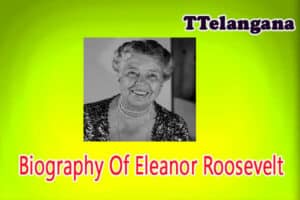Biography Of Eleanor Roosevelt
Eleanor Roosevelt was the First Lady of the United States from 1933 to 1945. She also was an advocate for civil and human rights. She was appointed an envoy for the UN General Assembly and played a crucial role in the creation of the Universal Declaration of Human Rights. She was also a key person in John F. Kennedy’s Presidential Commission regarding the condition of women.
“The future is for anyone who believes in the power of their visions.”
– Eleanor Roosevelt
She was born on October 11, 1884. In her early years, her father and mother died and she was raised by her mother’s grandmother.
Eleanor Roosevelt in the latter part of her teens began to participate in social work and was a volunteer in the poor areas in East New York. The year 1902 was the time she got to know Franklin D. Roosevelt who was studying at Harvard. Despite some opposition from Franklin’s mother in 1905.
They had six kids, however, their marriage was not without its challenges. When they were married in 1918 Eleanor was aware that Franklin was engaged in an affair. This could have resulted in divorce but was stopped by family members and friends who advised them to remain together. But, it altered the relationship, and Eleanor began to be more independent in the process.
In the year 1921 Franklin had been struck by leg paralysis that left him in a wheelchair. Eleanor was crucial in aiding Franklin overcome his handicap and successfully helped him resume public life.
in the 20s Eleanor was a schoolteacher in the 1920s, teaching the arts in addition to American historical events throughout New York. But she was increasingly finding the time to get involved in state and local politics. She gained a lot of influence within the New York Democratic Party and was a campaigner on many issues like promoting the goals of the Women’s Trade Union League.
Biography Of Eleanor Roosevelt

Eleanor’s political activism as well as her popularity contributed to her husband’s political success and helped him win support from women and labor groups.
The year 1932 was the time that Franklin D. Roosevelt was elected President against the background of the Great Depression and mass unemployment. His election came with a brand new mandate to increase government intervention, to provide a ‘New Deal for the jobless. As the First Lady, Eleanor was a departure from the norm and became a well-known person at rallies and visitations of unemployed people. The public was impressed by her determination to help those who were left out of the great depression, and her profile on the public stage was extremely high.
Eleanor also served as an example for women during a period when women seldom ventured outside of their homes. To communicate her ideas, Eleanor wrote a daily newspaper column as well as other articles. These included women’s issues as well as general human rights issues.
“It isn’t enough just to discuss peace. It is essential to believe in it. It’s not enough to just believe it. You must be working at it.”
— Eleanor Roosevelt – Voice of America broadcast (11 November 1951)
Second World War
During the Second World War, Eleanor was assigned even more responsibilities and was able to provide moral aid to the military. The year 1943 saw her trip to soldiers in the Pacific as a huge achievement, with even the most skeptical acknowledging that her presence and commitment were a huge influence on increasing the morale of soldiers.
In the course of the conflict, Eleanor also supported the rights of black Americans (such as the Tuskegee Airmen) to be trained as fighter pilots and to play a part in the American military. In various instances, Eleanor made efforts to get more access to civil rights and justice for the US black community, which was at that time experiencing significant discrimination.
In the last weeks of the war, Franklin died. The grief of Franklin’s passing was magnified for Eleanor because she knew that he had spent his final hours with a different female, Lucy Mercer, who was previously involved in an affair with.
Biography Of Eleanor Roosevelt
Following the war, Harry Truman, who succeeded Franklin D. Roosevelt, named Eleanor to serve as a delegate for the United Nations General Assembly.
” The mobilization of the world’s opinion and techniques of negotiation must be developed and utilized by each nation to build the United Nations.”
– Eleanor Roosevelt.
With a great passion for the ideals and ideals of the United Nations, Eleanor helped in the creation of the Universal Declaration of Human Rights which was adopted by the General Assembly on December 10, 1948. Eleanor believed that this was one of her biggest achievements, and described it as an internationally recognized Magna Carta of all mankind. She was an active member of the United Nations until Eisenhower’s election victory in 1953.
“We are on the brink of an event of immense significance in the history of the United Nations and the human condition. This declaration could be the world’s Magna Carta for all men across the globe.”
– Eleanor Roosevelt
In the years following the war, Many advised her to be a candidate for public office, but she turned down and opted to focus on non-partisan public work.
Following Kennedy’s election, John F. Kennedy was appointed by The United Nations between 1961 and 1962.
After contracting tuberculosis of the bone marrow, she died on the 7th of November, 1962. The funeral ceremony was attended by Presidents Truman, Eisenhower, and John F. Kennedy.
Tags: eleanor roosevelt,eleanor roosevelt biography,eleanor roosevelt documentary,roosevelt,eleanor roosevelt bio,eleanor roosevelt speech,biography of eleanor roosevelt,biography,franklin roosevelt,eleanor roosevelt first lady,eleanor,eleanor roosevelt (politician),eleanor roosevelt audio cd,#eleanor roosevelt,franklin d roosevelt,the biography channel,eleanor roosevelt quotes,#eleanor roosevelt biography best,#eleanor roosevelt biography video